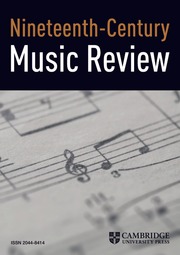No CrossRef data available.
Article contents
Digital Sources for Nineteenth Century Music in Portugal: ‘A Long Way to Run’
Published online by Cambridge University Press: 14 August 2023
Extract
Discussing music in Portugal in the nineteenth century, and the digital resources that the country makes available for musicological research on this historical period, requires, first of all, a clarification about the chronological boundaries that limit this temporal unit. One can naturally understand that the periodization to be adopted should be the most obvious, that is, the one that determines the dates 1801 and 1900 as the beginning and end of the century in question. But it is worth asking whether it would not be more appropriate to define a periodization based on the events that unequivocally determined the panorama of music in Portugal in that century.
- Type
- Digital Resource Review Article
- Information
- Copyright
- Copyright © The Author(s), 2023. Published by Cambridge University Press
References
1 Eric Hobsbaum, The Age of Revolution: Europe: 1789–1848, The Age of Capital: 1848–1875 and The Age of Empire: 1875–1914 (London: Weidenfeld & Nicolson, 1962, 1975 and 1987).
2 https://bndigital.bnportugal.gov.pt/. We would like to thank Isabel Novais Gonçalves and the whole team of the Music Department of the National Library of Portugal for their support.
3 de Vasconcelos, Joaquim, Os musicos portuguezes: biographia-bibliographia (Porto: Imprensa Portugueza, 1870)Google Scholar, https://purl.pt/30782, and Vieira, Ernesto, Diccionario biographico de musicos portuguezes: historia e bibliographia da musica em Portugal (Lisbon: Lambertini, 1900)Google Scholar, https://purl.pt/30781.
4 Since they are printed materials that exist in many libraries, these works are also available in other online platforms such as the Internet Archive.
5 da Fonseca Benevides, Francisco, O Real Theatro de S. Carlos de Lisboa desde a sua fundação em 1793 até á actualidade: estudo historico (Lisbon: Typ. Castro Irmão, 1883)Google Scholar, https://purl.pt/799.
6 Cesar A. das Neves and Gualdino de Campos, Cancioneiro de musicas populares contendo letra e musica de canções, serenatas, chulas, danças, descantes, cantigas dos campos e das ruas, fados, romances, hymnos nacionaes, cantos patrioticos, canticos religiosos de origem popular, canticos liturgicos popularisados, canções políticas, cantilenas, cantos maritimos, etc. e cançonetas estrangeiras vulgarizadas em Portugal / collecção recolhida e escrupulosamente trasladada para canto e piano por …, 3 vols (Porto: Typ. Occidental, 1893–99), https://purl.pt/742.
7 Information about Marcos Portugal can be located at the Musical Archive of the Metropolitan Chapter of Rio de Janeiro (http://acmerj.com.br/).
8 The Choirbook collection includes 131 specimens that have also been digitized and that may fit into the historical period under study here, but they are still awaiting analytical work before any conclusions can be drawn.
9 Maria José Artiaga, ‘Os condes de Redondo e a paixão pela música’, in Palácio dos condes de Redondo, coord. Miguel Figueira de Faria, Nuno Gonçalo Monteiro and José de Monterroso Teixeira (Lisbon: UAL/Scribe, 2022): 346–54.
10 https://doi.org/10.5281/zenodo.7896460. Since the project does not finish until the end of 2023, the final site is not yet available online.
14 https://www.tndm.pt/pt/biblioteca-arquivo/colecoes-digitais/. See also Cranmer, David, Música no D. Maria II: catálogo da coleção de partituras (Lisbon: Teatro Nacional D. Maria II – Bicho do Mato, 2015)Google Scholar.
16 A Arte Musical: jornal artistico, critico e litterario (1873–75); A Arte Musical: revista quinzenal (1890–91) and A Arte Musical: revista publicada quinzenalmente, dir. Michel'angelo Lambertini (1899–1915).
17 Maria José Artiaga, ‘A Gazeta Musical de Josephine Amann’, in A imprensa como fonte para a história da interpretação musical, coord. Cristina Fernandes and Miguel Ángel Aguilar Rancel (Lisbon: Biblioteca Nacional/INET-md, 2021): 45–58.
19 A Revolução de Septembro / ed. resp. J.F.S. Castro, no. 1 (22 June 1840) – 60, no. 15031 (20 January 1901) – Lisbon: Typ. J. B. da A. Gouveia, 1840–1901, https://purl.pt/14345. O Jornal do Porto / propr. Jose Barboza Leão, no. 1 (1 March 1859) to no. 250 (27 October 1892) (Porto: Typ. Commercial, 1859–1892), https://purl.pt/14338.
22 ‘O jornalismo iconográfico em Portugal na viragem do século XIX para o XX: O Ocidente (1875–1915)’, in Notícias em Portugal: estudos sobre a imprensa informativa (séculos XVI–XX) (Lisbon: ICNOVA – Instituto de Comunicação da NOVA, 2018): 220–22.
23 The periodical owed its name to António Maria de Fontes Pereira de Melo (1819–1887), one of the top political figures of the regime, who occupied the post of prime minister during three long periods. It documented the final phase of the constitutional monarchy. For further information see Cotrim, João Paulo, Rafael Bordalo Pinheiro – Fotobiografia (Lisbon: Assírio & Alvim, 2005)Google Scholar and José-Augusto França, Rafael Bordalo Pinheiro (Lisbon: Livraria Bertrand, 1981).
24 Rocha, Luzia, Ópera & Caricatura: O Teatro de S. Carlos na Obra de Rafael Bordalo Pinheiro, 2 vols. (Lisbon: Colibri – Centro de Estudos de Sociologia e Estética Musical, 2010)Google Scholar.
31 Maria João Albuquerque, ‘La edición musical en Portugal (1834–1900): un estudio documental’ (PhD diss., Universidad Complutense de Madrid, 2013).





